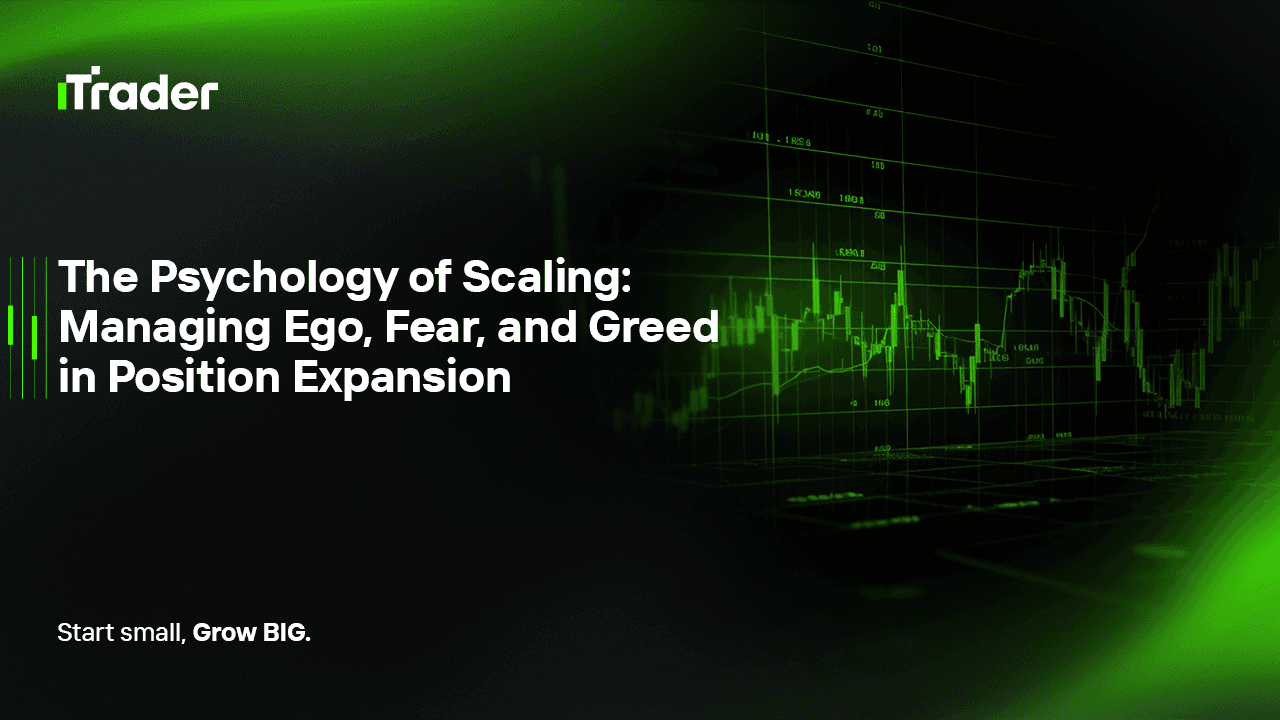2025-10-30
In prop trading, scaling—the art of increasing or reducing position size as a trade develops—is more than a technical skill. It’s a direct reflection of a trader’s inner world: ego, fear, greed, and self-control.

When done right, scaling amplifies returns while maintaining balance with risk. When done wrong, it exposes the fragile core of a trader’s psychology—where overconfidence, impatience, and denial quietly sabotage performance.
Scaling, at its essence, isn’t about maximizing profit. It’s about mastering the emotional geometry between conviction and control.
Scaling can take several forms:
From a psychological standpoint, each action represents a different emotional state:
The key is not just knowing when to scale, but why you’re scaling. Every decision must come from a system, not from the mind’s emotional volatility.
Ego is the most seductive driver in position expansion. It whispers:
“You’re right—double down.”
“You saw this coming—go bigger.”
When traders experience a string of wins, their ego inflates. The market starts to feel predictable. This illusion of control encourages reckless scaling—adding size simply to validate identity, not strategy.
Ego-driven scaling often shows up as:
In prop trading, where daily drawdown and max loss are strict, ego can destroy accounts faster than poor technicals. The cure is humility through data—objective, statistical feedback that overrides personal narratives.
Fear is the counterbalance to ego, but it’s equally destructive when unmanaged.
Common manifestations of fear in scaling:
Fear-based behavior stems from a loss-anchored mindset: the trader remembers past pain more vividly than future potential.
In prop environments, where psychological pressure is constant, fear narrows perception. The trader stops trading the market and starts trading their memory.
To manage fear, a trader must reconnect with process logic:
Greed is often mistaken for ambition. But where ambition seeks mastery, greed seeks immediate gratification.
In scaling, greed manifests when:
Greed amplifies volatility—not just in the market, but in the trader’s emotions.
It shifts attention from process-based execution to outcome-based obsession.
The antidote to greed is discipline through structure:
Ego, fear, and greed rarely appear in isolation—they form a self-reinforcing cycle:
Breaking this cycle requires self-awareness in real time. Prop traders who survive long-term are not those who eliminate emotion, but those who can observe emotion without obeying it.
A robust scaling framework provides emotional safety. It transforms impulsive reactions into mechanical decisions.
Example framework:
This method creates bounded flexibility—enough room to capitalize on momentum, but strict enough to prevent emotional overreach.
By embedding psychological control into quantitative rules, the trader ensures that scaling becomes an extension of structure, not ego.
Before adding to any position, ask:
This self-dialogue keeps the conscious mind in control. It turns impulsive moments into reflective pauses—the difference between a disciplined trader and an emotional one.
Prop firms impose strict limits—max daily loss, overall drawdown, and profit targets. These constraints amplify the psychological tension behind scaling.
This paradox pressures traders into emotional decision-making. The solution is risk normalization:
When scaling becomes a function of system logic, not ambition, your prop account’s longevity multiplies.
Professional scaling requires emotional neutrality—the ability to engage fully with the market while remaining detached from the outcome.
This is cultivated through:
With time, the trader learns to interpret scaling opportunities as data events, not emotional triggers.
Scaling is not about adding more lots—it’s about adding more clarity.
Every position expansion magnifies not only your potential profit but also your psychological weaknesses.
To scale effectively in the prop firm environment, you must:
Ultimately, the art of scaling lies in psychological symmetry:
Confidence without arrogance.
Caution without paralysis.
Ambition without overreach.
A trader who can balance these forces doesn’t just scale positions—they scale themselves.
© 2025 iTrader Global Limited | Company registration number 15962
iTrader Global Limited is located at Hamchako, Mutsamudu, Autonomous Island of Anjouan, Union of Comoros, The Comoros and is licensed and regulated by the Securities Commission of the Comoros. Our license number L15962/ ITGL
iTrader Global Limited, operating under the trading name “iTrader,” is authorized to engage in Forex trading activities. The company’s logo, trademark, and website are the exclusive property of iTrader Global Limited.
Risk Warning: CFD trading carries a high risk of rapid capital loss due to leverage and may not be suitable for all users.
Trading in funds, CFDs, and other high-leverage products requires specialized knowledge.
Research indicates that 84.01% of leveraged traders incur losses. Please ensure you fully understand the risks and are prepared to lose your capital before engaging in leveraged trading.
iTrader hereby states that it will not be held fully responsible for leveraged trading risks, losses, or other damages incurred by any individual or legal entity.
The news and information provided on this website are for educational purposes only. Users should make independent and informed financial decisions.
Restrictions: iTrader does not direct its website or services to residents of countries where such activities are prohibited by law, regulation, or policy. If you reside in a jurisdiction where the use of this website or its services is restricted, you are responsible for ensuring compliance with local laws. iTrader does not guarantee that the content of its website is appropriate or lawful in all jurisdictions.
iTrader Global Limited does not provide services to citizens of certain countries, including (but not limited to): the United States, Brazil, Canada, Israel, and Iran.